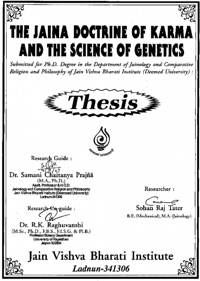The term karma is derived from the root 'krñ karaṇe' by adding the suffix 'manin' to the root and the common meanings of the term are—action, worth doing, implementation, duty, act, profession, tendency etc. So whatever is done falls under the category karma.[1] The term karma stands for two different meanings viz.; action and the subtle aggregates of the karmic matter. All types of movements whether physical or mental are known as actions. Apart from it, in Jaina Philosophy the term 'karma' denotes the subtle aggregates of the karmic matter which are attracted and assimilated by the soul.
Philosophy is dominated by religions in India. This is the reason why all the theistic religions here have acknowledged the existence of the power called karma or something equivalent to it which affects, covers and blunts the natural powers, attributes and purity of the soul. Different Philosophies talk of it by different names e.g. Vedānta Philosophical system calls it deception i.e. ignorance.[2] Yoga Philosophy uses karma āśaya' or kleṣa (affliction) etc. words for it.[3]
The term 'adṛṣṭa' (unseen) and 'saṁskara' used in Nyāya school of thought also represent the same. The Buddhists call karma as 'vāsanā' (predispositions) and 'avijñapti' (non-knowledge).[4] 'dharma-dharma' the term used in Vaiśeṣika Philosophy is also equivalent to the word karma used in Jaina Philosophy.[5] The term 'paśa' (snare/fetter) employed in Saiva school of Philosophy is also synonymous to the word 'karma' as used in Jaina Philosophy. The word apūrva (singular/unique) of the mīmāṁsā school of Philosophy is also used to denote the same concept.[6]
Fate, meritorious action, sin etc., are numerous words that are commonly used in Philosophical scriptures. In Jaina canonical literature along with the word 'karma' the terms such as 'karmaphala', 'karmaraja' etc., are also used.[7]
Many schools of Philosophy merely make a mention of karma while many others go deep discussing its various aspects. According to Nyāya school of Philosophy karma (adṛṣta) is an attribute of the soul. Good as well as bad actions leave an impression on the soul, and that is adṛṣta. It lingers with the soul till it bears its results. Its results are brought forth through God.[8] The Buddhists acknowledge the predispositions or impressions (Vāsanā) of the soul as karma. Vāsanā becomes the cause of pleasure and pain as per cause and effect relationship.
Brahma Sūtra with the commentary of Śanker 2.1.14) Saṁkhya thought calls it prakṛti (the nature) or Saṁskāra [(a) Sāṁkhyakīritā (b) Sāṁkhya tattva kaumudi
 Prof. Dr. Sohan Raj Tater
Prof. Dr. Sohan Raj Tater
 Doctoral Thesis, JVBU
Doctoral Thesis, JVBU